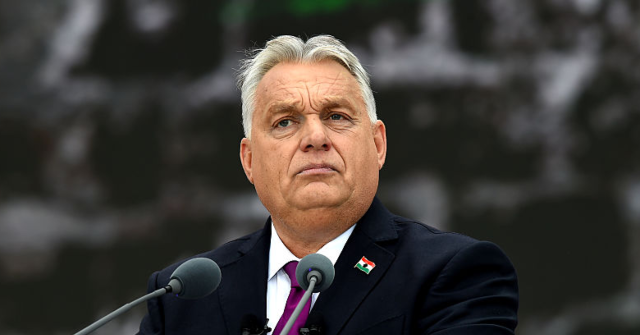Hungarian Prime Minister Viktor Orbán said in an interview on Friday that his country was not planning to abide by President Donald Trump’s recent sanctions imposed on the Russian oil industry and was studying ways to “circumvent” them.
The U.S. Department of the Treasury announced sanctions on Wednesday targeting Russian oil giants Rosneft and Lukoil in response to Russia’s insistence on continuing its two-year-old, full-scale invasion of Ukraine — an expansion of efforts of conquest that began in 2014. The sanctions followed the announcement that a proposed in-person meeting between Trump and Russian strongman Vladimir Putin, scheduled to take place in Hungary, would no longer occur. Trump later confirmed that he canceled it because it “didn’t feel right” to meet.
The three parties involved appear to anticipate that such a meeting in Budapest may still take place in some undetermined future, but requires more negotiations to ensure that they would be productive.
Discussing the sanctions that Washington announced after canceling the Budapest summit, Orbán, speaking to the Hungarian Kossuth radio station, indicated that he did not intend to abide by them.
“Indeed, there are sanctions against some Russian oil companies… We are working on how to circumvent those sanctions,” Orbán said, according to a translation by the Russian news agency Tass. “We continue to fight. This battle is not yet lost.”
Elsewhere in comments on Friday, Orbán — who had been publicly enthusiastic about the Budapest summit prior to its postponement — insisted that it would take place eventually.
“There is no question that the peace summit will happen. Everyone knows this, and everyone knows the Russians will reach an agreement with the Americans,” Orbán predicted. While defying Trump’s sanctions, Orbán was complimentary of the American president, insisting that the situation in Gaza was “even more complicated” and Trump succeeded in organizing a peace summit to end hostilities between Israel and the genocidal terrorist organization Hamas.
“These things can come together in two to three days,” he said of summits like the one envisioned for his capital city.
Orbán had previously described the summit as an “existential” matter for Hungary.
“Energy and gas prices soared, inflation skyrocketed, we lost money on sanctions, trade declined, bond yields rose, and the cost of financing the country increased,” he said in an interview on Monday, listing the negative effects on his country of the invasion of Ukraine. “If peace is achieved, all this will end. The Hungarian economy can finally breathe again and return to pre-war growth. Everyone will earn more — and yes, even bread will become cheaper.”
“For Hungary, it is a fundamental existential interest that the Budapest Peace Summit succeeds. Let us do everything to make it happen,” Orbán affirmed.
Hungary is a substantial purchaser of Russian crude oil, depending on the country for many of its fuel needs. Notably, the European Union, which has sanctioned Russia nearly 20 times since the onset of the full-scale invasion, nevertheless relies on Russia for its fuel needs.
Hungarian fuel company MOL reported an explosion at a critical refinery in Szazhalombatta late on Monday linked to refining Russian crude oil. The fire did not result in any casualties but set back some of the refineries activities. At press time, MOL has stated the cause of the fire remains under investigation and on Tuesday it restarted some refinery units not affected by the fire.
“In the coming period, we will focus on Hungarian supply and consider the need to use strategic reserves,” MOL said.
Trump had initially announced plans for a summit with Putin in Budapest on October 16. Prior to that, he said in a message posted to Truth Social that he had spoken to Putin on the phone and the two planned to have their top diplomats, Secretary of State Marco Rubio and Foreign Minister Sergey Lavrov, hold their own phone conversation. That conversation occurred, but neither side publicly suggested any major progress on ending the war had occurred.
Orbán and Trump have largely supported each other politically and Orbán has been effusively complimentary about much of Trump’s foreign policy. The Hungarian prime minister’s rejection of Russian sanctions is not without precedent, though Orbán has largely limited his government to defying Trump on the matter of China, not Russia. Orbán’s government has embraced China’s “Belt and Road Initiative” (BRI), a global infrastructure debt trap that Beijing uses to colonize poorer countries, and celebrated expanding the Communist Party’s influence in the country. In May, addressing Trump’s calls for the world to reject China’s dominance on manufacturing and communist influence on foreign economies, the Hungarian government condemned the move.
“Definitely not,” Hungarian Deputy Minister of Foreign Affairs and Trade Levente Magyar said during an interview that month, asked about potentially decoupling the Hungarian economy from China. “That’s a red line for us. We’re having excellent trade relations with China, and China has become one of the biggest investors in Hungary.”
“Hungary is benefiting from these very intensive Chinese economic and trade relations. We’re not willing to give those up,” he insisted.
Follow Frances Martel on Facebook and Twitter.
Read the full article here


